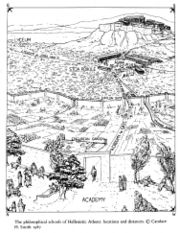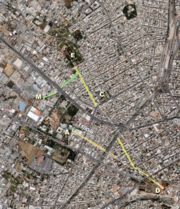Epicurus' Garden
From Epicurus Wiki
At age 35 (306 or 307 BCE) Epicurus purchased a Garden just outside Athens where he set up the final location of his school. The property was purchased for the sum of eighty minae. Epicurus taught philosophy in the Garden continuously until his death. In his will, Epicurus transfered control of the property to Hermarchus, along with a house in Melite, which may have been Epicurus' primary residence and publishing house.
Garden Life
The Garden in Athens was the "main campus" of the Epicurean school where lectures could be heard. Its location near the Academy was perhaps chosen strategically, in order to better compete with it.
The Memmian Intrigue
When Cicero paid a visit to Athens in 51 BCE, a displacement of the old site of Athens was underway. The quarters of the city nearest the harbor were falling into decay, and the general movement of habitation was to the north. Epicurus' original garden was by then in ruins, and a Roman noble, the very Memmius to whom Lucretius dedicated his poem, had obtained authorization of the Areopagus to use it as a building-site.
Whether the proposed edifice was a memorial to Epicurus is unknown. At any rate, the Epicureans were alarmed by potential desecration of their sacred places. Patro, who was now the head of the school, wrote to Cicero, already informed by Phaedrus of the situation, and asked him to intervene and maintain for the sake of the society, "honour, duty, testamentary right, the injunction of Epicurus, the protest raised by Phaedrus, the abode, the dwelling, the footprints of illustrious men." As Atticus supported the request, Cicero promised to write to Memmius, who had already abandoned his architectural designs, but was on bad terms with Patro. The outcome of the intervention is unknown.
The Garden Motto
In his Letters to Lucilius (21.10), Seneca advises his addressee to "Go to Epicurus' Garden." Seneca is likely speaking metaphorically here, but one may still wonder if the "motto" he refers to was an actual inscription at the actual Garden site:
Go to his Garden some time and read the motto carved there: “Dear Guest, here you will do well to tarry; here our highest good is pleasure.” The caretaker of that abode, a friendly host, will be ready for you; he will welcome you with barley-meal, and serve you water also in abundance, with these words: “Have you not been well entertained? This garden does not whet your appetite; but quenches it. Nor does it make you more thirsty with every drink; it slakes the thirst with a natural cure – a cure that requires no fee. It is with this type of pleasure that I have grown old.”
The Location of the Garden Today
Cicero, in De Finibus V, places the location of Epicurus' Garden on the way to the site of Plato's Academy. Specifically, he indicates that the Academy is reached by a six stadia walk from the Dipylon Gate. Since one stadium is equal to about 185 meters, the Academy would be located roughly 1100 meters from the Gate, or 0.7 miles. Candace H. Smith, in The Hellenistic Philosophers provides an illustration (on the left) in accordance with this portrayal.
Pinpointing these locations in modern Athens, however, isn't so straightforward. Only the location of the Dipylon Gate is known with certainty -- seen on the satellite image at right at (D). A distance of 1100m on a WNW heading ends up at the Agricultural University of Athens (A). It is now generally supposed, however, that Plato's Academy might lie within the excavated portions of the Academy Suburb of Athens (E), even though that would be no closer than 1600m from the Dipylon Gate on a NNW heading. Yet, it is interesting to note that whichever route is traced, either can be said to "pass by" location (C), the site of a Christian church: Haghios Georgios (St. George). Given the established pattern of Early Christians to replace important places of learning and Pagan temples with churches, and considering the hostility that famous Christian authors exhibited towards the legacy of Epicureanism, it's not too much of a stretch of the imagination to suppose that the site of the Garden could very well be here. Another enchanting possibilty, though, in keeping with placing Plato's Academy at (E), is that the Garden site was located off the street now named after Metrodorus, which leads to (M) -- a position adjacent to the northwest side of the Agricultural University campus.

